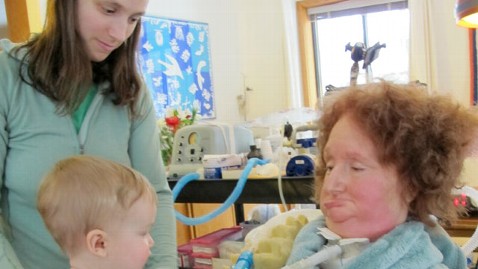Feb 15, 2013 7:00am

Catherine Wolf, pictured with her daughter Laura and her granddaughter Scarlett, has been living with Lou Gehrig's disease for 17 years.
By Catherine G. Wolf:
I am in my seventeenth year with ALS, also known as Lou Gehrig?s disease ? more than half of my younger daughter?s life. I am a quadriplegic and dependent on a ventilator to breathe. I?m one of the 10 percent who make it past ten years.
Most people with ALS die of respiratory failure. Many choose not to go on the ventilator, mostly because of the cost of care. But when I was faced with this choice in May 2001, at the age of 54, I decided I had not seen enough of life. My two daughters hadn?t graduated from college, hadn?t married, and most importantly, had not made me a grandma.
My insurance company provided some nursing care in the early years, but in February 2004, my insurance case manager suggested I move to a nursing home or give up my nurses. But I have always been a fighter. I hired the best disability lawyer in New York City, and appealed for full-time nursing.
The first appeal was to the insurance company. As expected, they turned me down. But in September, just after my older daughter?s wedding, an independent organization ruled in my favor. Certainly, my nurses have contributed to my longevity.
In my 17 years with ALS, I?ve seen many promising drugs bite the dust, including one trial in which I participated in 1999. It was the trial of topiramate, a drug prescribed for epilepsy. During the open label stage of the trial, in which all participants are eligible to take the experimental drug, I learned that I was in the topiramate group. I was exhilarated ? finally something to slow the progress of my deadly disease. But my exhilaration didn?t last.
The researcher leading the trial, Dr. Merit Cudkowicz of Massachusetts General Hospital in Boston, called to tell me to stop taking the drug. Inexplicably, topiramate put ALS patients at an increased risk of blood clots in the lungs and the deep veins of the legs.
Most recently, the drug dexpramipexole, tested in a clinical trial involving 943 people at 81 hospitals, failed to slow the progression of ALS or prolong survival. To get to this phase of testing, called phase 3, drugs must show efficacy in animals as well as safety and promise in humans. The failure of ?dex? was a big downer in the ALS community.
A quick search of clinicaltrials.gov generates 213 clinical trials for ALS. Yet more than 60 years after the death of Lou Gehrig, the disease has no effective treatments. Its rarity makes it an ?orphan? disease, and drug companies prefer to invest in drugs to treat more common diseases.
Even when there are promising drug trials, they tend to exclude people who have had the disease for more than two or three years ? people like me. That?s because the biology of the disease varies depending on how quickly it progresses, and most trials require that participants to be able to breathe on their own. So because I?ve lived with ALS for 17 years and it stole my ability to breathe without a ventilator, I don?t qualify for the trials.
My beef is that there may be drugs that slow progression at different stages of the disease. ALS is not one disease, but rather a spectrum of diseases. Therefore, clinical trials should include people they typically exclude.
I recently read that the FDA was going to hold a public hearing on drug development for ALS. And while I couldn?t travel from my home in Katonah, N.Y. to the hearing location in suburban Washington, D.C., I knew I wanted to participate. I wanted to encourage anyone with ALS to participate. So I spent several hours on the website regulations.gov figuring out how to submit electronic comments.
For those who wish to participate in the ALS-specific hearing on Feb. 25, there is a Facebook page and a forum topic in the ALS room of patientslikeme.com. Both have detailed instructions for participating in person or by submitting an electronic comment.
I told the FDA they should encourage companies to include people like me in their treatment trials. The FDA sets the standards for clinical trials and could insist that drug companies include people with more advanced ALS.
I understand that measuring the response to a particular treatment is an issue when people can?t move, eat or breathe on their own. But I and researchers found a way to extend the ALS Functional Rating Scale ? the most widely used measure of function in ALS trials ? to distinguish abilities among those with advanced ALS. If there is a need to extend it further, I?m sure it can be done.
I hope the FDA hearing overflows with ALS patients, caregivers and health professionals. I hope the system for electronic comments breaks down under the weight of comments. Because, as people living with ALS, we need to make a big noise.
Catherine Wolf is a psychologist and expert in the field of human-computer interaction. She is participating in research on brain-computer interface ? technology she may one day rely on to communicate.
This is the first in a series of blogs written by people who are living with medical conditions.
my sisters keeper kirby sarah palin cbi the shins atomic clock daylight savings time
No comments:
Post a Comment
Note: Only a member of this blog may post a comment.